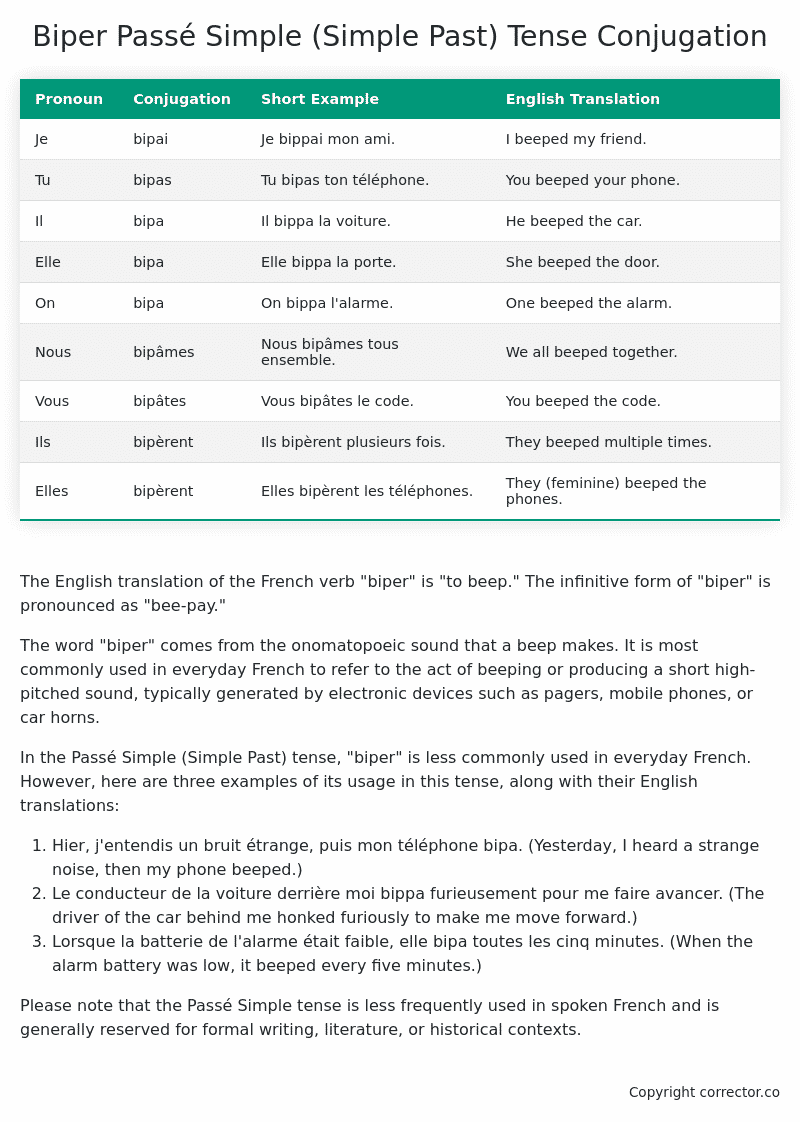Passé Simple (Simple Past) Tense Conjugation of the French Verb biper
Introduction to the verb biper
The English translation of the French verb “biper” is “to beep.” The infinitive form of “biper” is pronounced as “bee-pay.”
The word “biper” comes from the onomatopoeic sound that a beep makes. It is most commonly used in everyday French to refer to the act of beeping or producing a short high-pitched sound, typically generated by electronic devices such as pagers, mobile phones, or car horns.
In the Passé Simple (Simple Past) tense, “biper” is less commonly used in everyday French. However, here are three examples of its usage in this tense, along with their English translations:
- Hier, j’entendis un bruit étrange, puis mon téléphone bipa. (Yesterday, I heard a strange noise, then my phone beeped.)
- Le conducteur de la voiture derrière moi bippa furieusement pour me faire avancer. (The driver of the car behind me honked furiously to make me move forward.)
- Lorsque la batterie de l’alarme était faible, elle bipa toutes les cinq minutes. (When the alarm battery was low, it beeped every five minutes.)
Please note that the Passé Simple tense is less frequently used in spoken French and is generally reserved for formal writing, literature, or historical contexts.
Table of the Passé Simple (Simple Past) Tense Conjugation of biper
| Pronoun | Conjugation | Short Example | English Translation |
|---|---|---|---|
| Je | bipai | Je bippai mon ami. | I beeped my friend. |
| Tu | bipas | Tu bipas ton téléphone. | You beeped your phone. |
| Il | bipa | Il bippa la voiture. | He beeped the car. |
| Elle | bipa | Elle bippa la porte. | She beeped the door. |
| On | bipa | On bippa l’alarme. | One beeped the alarm. |
| Nous | bipâmes | Nous bipâmes tous ensemble. | We all beeped together. |
| Vous | bipâtes | Vous bipâtes le code. | You beeped the code. |
| Ils | bipèrent | Ils bipèrent plusieurs fois. | They beeped multiple times. |
| Elles | bipèrent | Elles bipèrent les téléphones. | They (feminine) beeped the phones. |
Other Conjugations for Biper.
Le Present (Present Tense) Conjugation of the French Verb biper
Imparfait (Imperfect) Tense Conjugation of the French Verb biper
Passé Simple (Simple Past) Tense Conjugation of the French Verb biper (You’re reading it right now!)
Passé Composé (Present Perfect) Tense Conjugation of the French Verb biper
Futur Simple (Simple Future) Tense Conjugation of the French Verb biper
Futur Proche (Near Future) Tense Conjugation of the French Verb biper
Plus-que-parfait (Pluperfect) Tense Conjugation of the French Verb biper
Passé Antérieur (Past Anterior) Tense Conjugation of the French Verb biper
Futur Antérieur (Future Anterior) Tense Conjugation of the French Verb biper
Subjonctif Présent (Subjunctive Present) Tense Conjugation of the French Verb biper
Subjonctif Passé (Subjunctive Past) Tense Conjugation of the French Verb biper
Subjonctif Imparfait (Subjunctive Imperfect) Tense Conjugation of the French Verb biper
Subjonctif Plus-que-parfait (Subjunctive Pluperfect) Tense Conjugation of the French Verb biper
Conditionnel Présent (Conditional Present) Tense Conjugation of the French Verb biper
Conditionnel Passé (Conditional Past) Tense Conjugation of the French Verb biper
Conditionnel Passé II (Conditional Past II) Tense Conjugation of the French Verb biper
L’impératif Présent (Imperative Present) Tense Conjugation of the French Verb biper
L’impératif Passé (Imperative Past) Tense Conjugation of the French Verb biper
L’infinitif Présent (Infinitive Present) Tense Conjugation of the French Verb biper
L’infinitif Passé (Infinitive Past) Tense Conjugation of the French Verb biper
Le Participe Présent (Present Participle) Tense Conjugation of the French Verb biper
Le Participe Passé (Past Participle) Tense Conjugation of the French Verb biper
Struggling with French verbs or the language in general? Why not use our free French Grammar Checker – no registration required!
Get a FREE Download Study Sheet of this Conjugation 🔥
Simply right click the image below, click “save image” and get your free reference for the biper Passé Simple tense conjugation!

Biper – About the French Passé Simple (Simple Past) Tense
Formation
Usage
Narration
Historical Context
Interactions with other tenses
Passé Composé
Imparfait
Conditional and Subjunctive
Summary
I hope you enjoyed this article on the verb biper. Still in a learning mood? Check out another TOTALLY random French verb conjugation!


